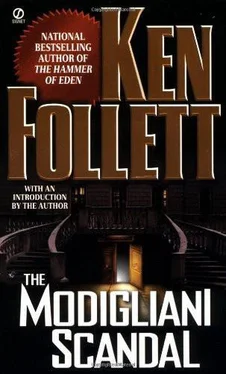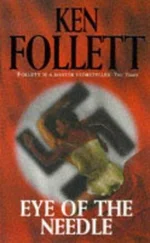Lipsey smiled. ″I′m a bit of a loner,″ he said with the air of one who makes something of a confession. ″When I′m on holiday, I like to get right off the beaten track. I just get in the car and follow my nose until I feel like stopping.″
″Where are you staying?″
″In Rimini. What about you—are you wanderers too?″
The girl started to say something, but the man interrupted her. ″We′re on a kind of treasure hunt,″ he said.
Lipsey thanked his stars for the boyfriend′s naivete. ″How fascinating,″ he said. ″What′s at the end of it?″
″A valuable painting, we hope.″
″Is it here, in Poglio?″
″Almost. There′s a chateau five miles up the road.″ He pointed south. ″We think it′s there. We′re going there in a while.″
Lipsey made his smile condescending. ″Well, it makes a holiday exciting—a bit out of the ordinary—even if you never find the treasure.″
″You bet.″
Lipsey drained his beer. ″Personally, I′ve seen enough of Poglio. I′m moving on.″
″Let me buy you another beer.″
″No, thanks. I′m in a car, and there′s a long, thirsty day ahead.″ He stood up. ″A pleasure to meet you. Goodbye.″
The Fiat was terribly hot inside, and Lipsey regretted not having the foresight to park it in the shade. He wound his window down and pulled away, letting the breeze cool him. He felt pleased: the couple had given him a lead, and let him get ahead of them. For the first time since he had started work on the case, he was on top of it.
He drove out on the southward road, in the direction the American had pointed. The road became dusty. He wound up his window and turned on the car′s air conditioning at full blast When it was cool again, he stopped to look at his maps.
The large-scale chart revealed that there was, indeed, a château to the south. It seemed more than five miles away—perhaps ten—but it was still quite conceivable that its postal address would be Poglio. It was slightly off the main road—if main road it could be called—and Lipsey memorized the directions.
The journey took him half an hour, because of the poorness of the roads and the absence of signposts. But when he arrived there was no mistaking the place. It was a big house, built about the same time as the church in Poglio. It had three stories, and there were fairy-tale towers at the corners of the facade. Bits of the stonework were crumbling, and the windows were not clean. A separate stables building had apparently been converted into a garage, and its doors stood open, revealing a gas-driven lawn mower and a very old Citröen station wagon.
Lipsey parked outside the gates and walked up the short drive. Weeds grew in the gravel, and as he got closer to the house it looked more and more dilapidated.
As he stood looking up at the house, a door opened and an elderly woman walked toward him. He wondered what approach to take.
″Good morning,″ she said in Italian.
Her gray hair was neat, she was elegantly dressed, and the bones of her face indicated that she had once been beautiful. Lipsey gave a small bow.
″I beg your pardon for this intrusion,″ he said.
″Don′t apologize.″ She had switched to English. ″How can I help you?″
Lipsey had learned enough about her to decide on his approach. ″I wonder whether one is permitted to look around the outside of this beautiful house.″
″Of course,″ the woman smiled. ″It is pleasant to find someone interested. I am the Contessa di Lanza.″ She extended her hand, and Lipsey shook it, mentally revising his estimate of his chances of success to around 90 percent.
″Dunsford Lipsey, Contessa.″
She led him around to the side of the house. ″It was built in the first quarter of the seventeenth century, when all the land around here was given to the family as a reward for service in some war or other. That was the time Renaissance architecture finally filtered through to the countryside.″
″Ah. Then it was built about the same time as the church in Poglio.″
She nodded in agreement. ″Are you interested in architecture, Mr. Lipsey?″
″I am interested in beauty, Contessa.″
He could see that she was suppressing a smile, and thinking that this stiffly formal Englishman had a certain eccentric charm. That was what he wanted her to think.
She talked to him about the house as if she were retelling a familiar tale, pointing out the place where the masons had run out of the right sort of stone and been forced to change, the new windows added in the eighteenth century, the small nineteenth-century west wing.
″Of course, we no longer own the district, and what land we have retained is rather poor. As you can see, too many repairs have been postponed.″ She turned to face him and gave him a self-deprecating smile. ″Contessas are two-a-penny in Italy, Mr. Lipsey.″
″But not all have a family as old as yours.″
″No. The newer aristocrats are businessmen and industrialists. Their families have not had time to grow soft with living on inherited wealth.″
They had completed the circuit of the house, and now stood in its shadow at the foot of one of the towers. Lipsey said: ″It is possible to grow soft on earned wealth, Contessa. I′m afraid I do not work very hard for my living.″
″May I ask what you do?″
″I have an antique shop in London. It′s on the Cromwell Road—you must visit next time you are in England. I′m rarely there myself.″
″Are you sure you wouldn′t like to see the inside of the house?″
″Well, if itʹs not too much trouble ...″
″Not at all.″ The Contessa led him through the front door. Lipsey felt the tingle at the back of his neck which always came near the end of a case. He had worked things just right: he had gently given the Contessa the impression that he might be willing to buy something from her. She was obviously in fairly desperate need of cash.
As she led him through the rooms of the house, his sharp eyes flitted quickly around the walls. There were a large number of paintings, mainly oil portraits of previous counts and watercolor landscapes. The furniture was old, but not antique. Some of the rooms smelled unused, their aroma an odd mixture of mothballs and decay.
She led him up the staircase, and he realized that the landing was the showpiece of the place. In its center was a mildly erotic marble of a centaur and a girl in a sensual embrace. The rugs on the highly polished floor were not worn. The walls all around were hung with paintings.
″This is our modest art collection,″ the Contessa was saying. ″It ought to have been sold long ago, but my late husband would not part with it. And I have been postponing the day.″
That was as near an offer to sell as the old lady would come, Lipsey thought. He dropped his pretence of casual interest and began to examine the pictures.
He looked at each one from a distance, narrowing his eyes, searching for hints of the Modigliani style: the elongated face, the characteristic nose which he could not help putting on women, the influence of African sculpture, the peculiar asymmetry. Then he moved closer and scrutinized the signature. He looked at the frames of the pictures for signs of re-framing. He took a very powerful, pencilbeam flashlight from his inside pocket and shone it on the paint, scanning for the giveaway traces of overpainting.
Some of the paintings needed only a glance; others required very close examination. The Contessa watched patiently while he went around the four walls of the landing. Finally he turned to her.
″You have some fine pictures, Contessa,″ he said.
She showed him quickly around the rest of the house, as if they both knew it was only a formality.
Читать дальше












